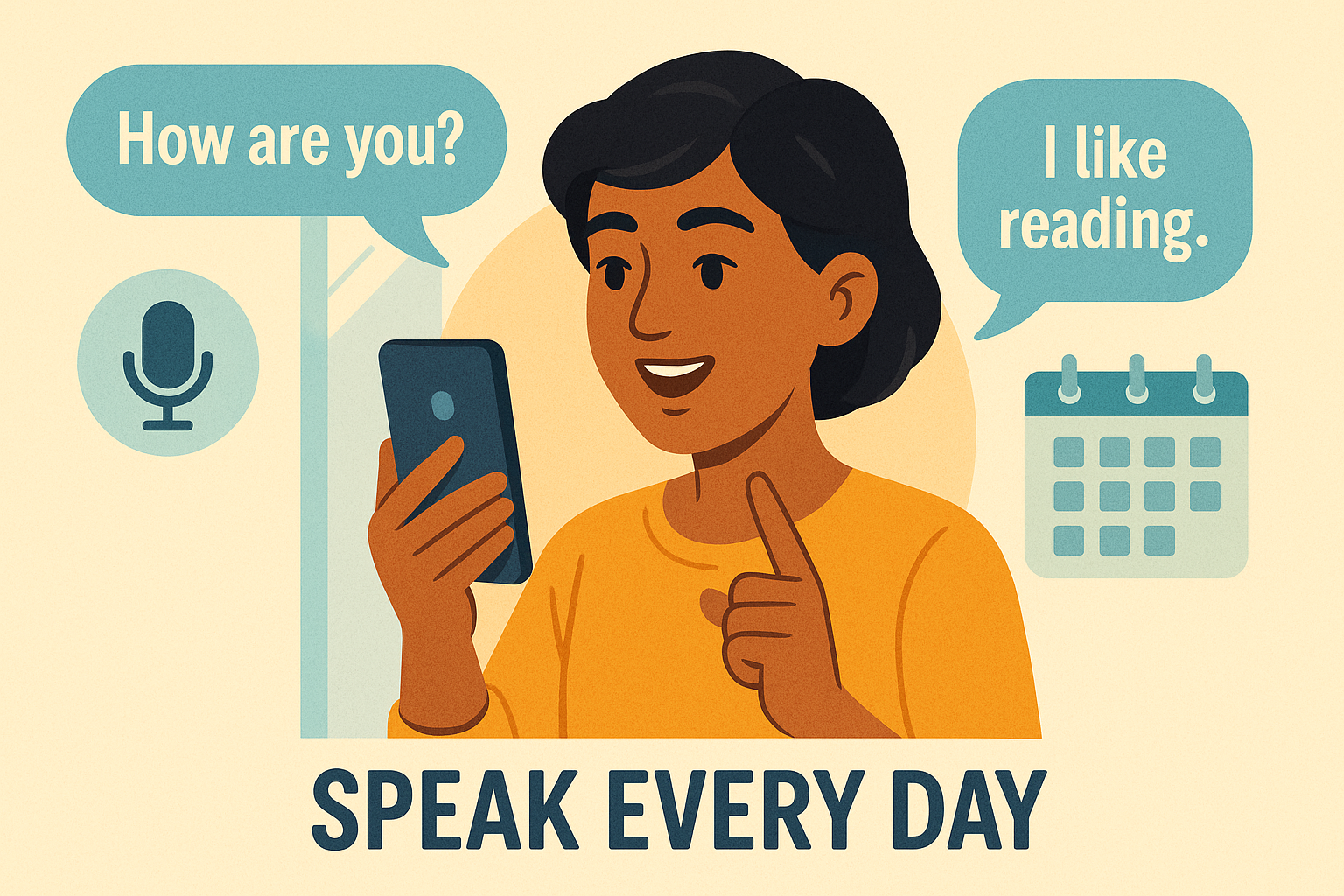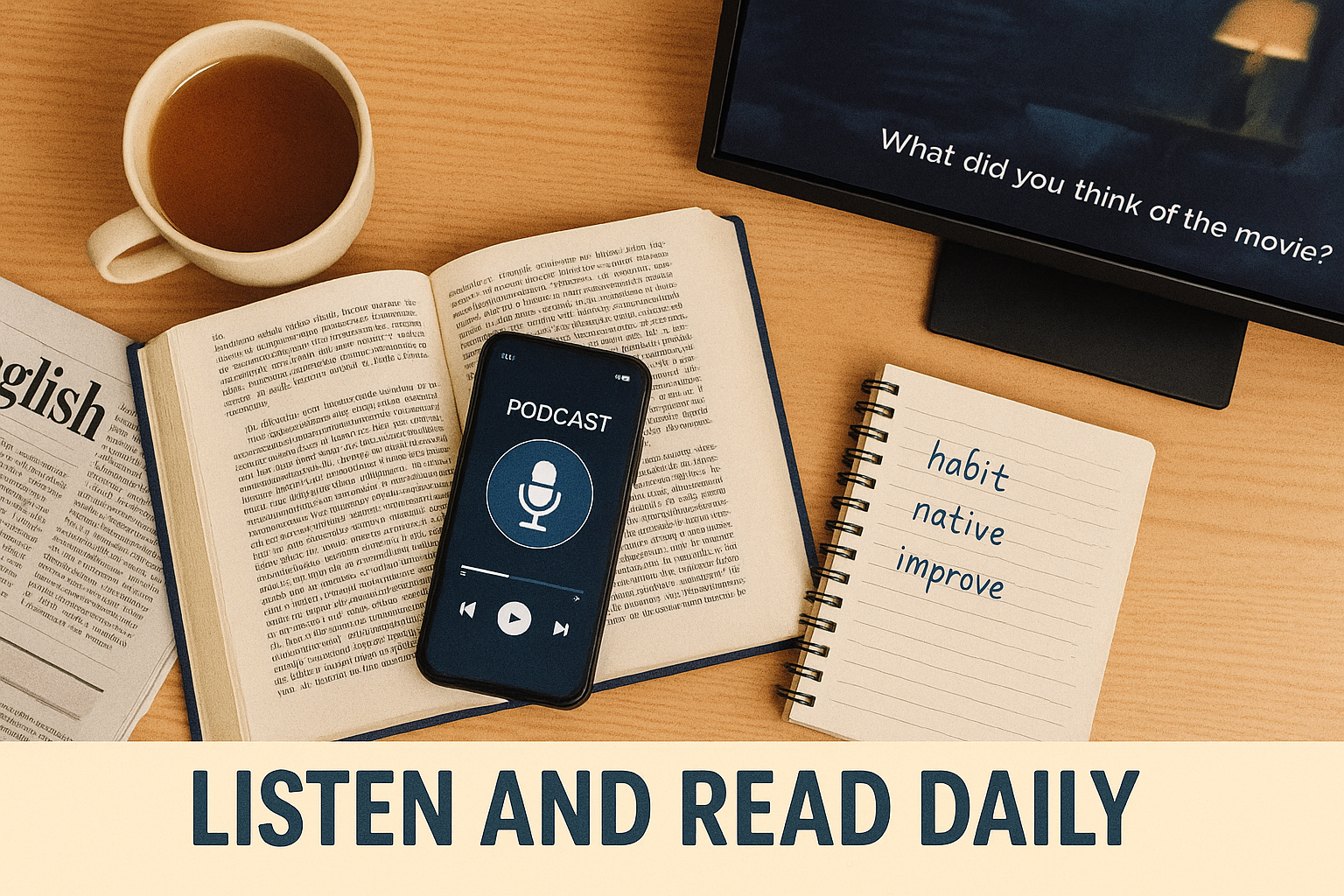Learn to Speak English Fluently from Home

12 Proven Ways to Speak English Fluently from Home Without Expensive Classes
English today is more than just a school subject, it’s the most widely used language in the world. It connects people across cultures, careers, and countries. From education to global business to social media, English opens doors to countless opportunities. However, in Bangladesh, while many can read or write English, the challenge often lies in speaking. When trying to speak English fluently, people hesitate. Words don’t come easily, or they translate directly from Bangla and lose their confidence.
The truth is, fluency is not about talent. It is about practice, habits, and regular exposure. Anyone can improve if they follow the right methods. The good news is you can do this from your own home. In fact, you do not need to travel abroad or pay for expensive classes to start speaking well.
Here are 12 effective and practical ways to begin your journey toward confident spoken English. Let’s start with the basics.
1.Build a Strong Foundation
Think of English like building a house. To stand tall, a house needs strong pillars. In English, those pillars are grammar, vocabulary, and sentence structure. Grammar gives your words order. Similarly, vocabulary gives you expression. Sentence structure ties everything together so your speech flows.
If you ignore one pillar, the building feels weak. For example, without grammar, you may know words but not be able to put them in order. Without vocabulary, you cannot say what you want. Start small. Revise basic grammar, like tenses and articles. Learn two or three useful words every week. Pay attention to sentence patterns in books or newspapers. These little steps create a strong base for fluent speech.
2. Speak Every Day
Speaking is like exercise. If you do it daily, you grow stronger. If you stop, your skills weaken. The best way to learn is not just to study English but to use it every day. Speak short sentences with friends, siblings, or colleagues. Ask someone, “Have you eaten?” or say, “I am going to the shop.”
Alternatively, if no one is around, practice alone. Describe your day aloud or stand in front of a mirror and speak for a few minutes. At first, it will feel awkward, but it quickly becomes normal. Daily speaking trains your tongue and mind to work together. The more you speak, the less you hesitate. Even 10 minutes a day makes a difference.

3. Think in English
One common habit that slows fluency is translating from Bangla to English in the head. It makes you pause and lose confidence. To speak fluently, you need to think directly in English. Start with easy thoughts such as, “I am tired” or “It is sunny today.” Slowly move to longer ideas, like planning your day in English.
For example, instead of thinking in Bangla, “আজ দুপুরে ভাত খাব,” and then translating, train yourself to think, “I will eat rice this afternoon.” At first it feels slow, but with practice it becomes automatic. Thinking in English cuts out the middle step of translation and makes your speech faster and smoother.
4. Reflect After Speaking
Every conversation is a chance to learn. After you speak English, take a few minutes to reflect. Ask yourself, “Which words did I use well? Where did I get stuck? Did I make any grammar mistakes?” Write down new words you heard from others. Note phrases you want to use next time.
For example, if you said, “I am going to home,” you can correct yourself later and remember that the right form is “I am going home.” This habit of reflection makes you more aware of your strengths and weaknesses. Improvement does not come from speaking perfectly every time. It comes from noticing mistakes and learning from them.
5. Listen and Read Daily
Fluent speakers do not only practice speaking. They also listen and read regularly. Listening gives you natural rhythm and pronunciation. Reading shows you how sentences and words are used in context.
Watch English movies, TV shows, or YouTube channels. Pay attention to how people use common expressions in daily life. Read English newspapers, blogs, or short stories. Even ten minutes of listening and reading daily can make a big difference. Over time, you will pick up common sentence patterns and vocabulary without even realizing it. Exposure to authentic English helps your own speech become smoother and more natural.
6. Enjoy English Through Entertainment
Learning does not need to feel heavy or boring. Entertainment makes it fun. Movies, web series, and TV shows are full of everyday conversations. Songs help you catch rhythm and pronunciation. TED Talks and podcasts introduce you to confident speaking styles and advanced vocabulary.
For example, watching a show like “Friends” can teach you casual conversation, while a TED Talk can teach you how to present ideas clearly. When you enjoy what you watch or listen to, you naturally pay more attention. Entertainment not only entertains you but also trains your ears and mind to absorb English in a natural way.
7. Record Your Voice
Recording yourself is one of the best self-learning methods. Choose a topic, such as “My favorite food,” and speak for one or two minutes. Then play it back. Listen carefully. Notice if any words are unclear, if your pronunciation sounds wrong, or if you pause too often.
At first, hearing your own voice may feel strange. But over time, it helps you see your progress. You will hear the mistakes that you do not notice while speaking. You will also feel proud when you notice improvement. Recording builds self-awareness and makes you a more confident speaker.
8. Focus on Pronunciation
Fluency does not mean copying a foreign accent. What matters most is clarity. If your listener understands you easily, you are doing well. Mispronounced words, however, can cause confusion.
Use tools like Google Translate or online dictionaries to hear correct pronunciation. Repeat the words until they feel natural. Focus on sounds that are difficult, like “th” in “think” or “v” in “very.” Say them slowly and practice daily. Clear pronunciation will make you feel confident, and it will help your listener follow your message without effort. Remember, being clear is more important than sounding foreign.
9. Expand Your Vocabulary
Words are the tools we use to express ideas. The more tools you have, the better you can build your message. But you do not need to learn hundreds of words at once. Focus on the ones you actually use.
For example, learn words about food if you often talk about cooking. Learn workplace vocabulary if you use English at the office. Write new words in simple sentences and practice them with others. Review them every week so you do not forget. This slow but steady method will grow your vocabulary naturally. With more words, you will speak with less hesitation and more confidence.

10. Learn Phrases, Not Just Words
Knowing words is good, but knowing phrases makes your English sound natural. Native speakers often use ready-made expressions. For example, instead of saying “I understand,” they might say, “That makes sense.” Instead of pausing in silence, they say, “Let me think.”
Phrases give your speech flow and rhythm. They also save time because you do not need to build every sentence from the beginning. Try learning two or three new phrases each week. Use them in your conversations. Soon you will notice that your English feels smoother and more natural, just like everyday conversation.
11. Use Prompts for Confidence
Starting a conversation is often the hardest part. You may know what you want to say but struggle with the first line. That is why it helps to keep some prompts ready.
For example, at work you might say, “Could you help me with this?” or “What do you think about this idea?” In casual situations, you could say, “By the way, have you watched that movie?” These small lines break the silence and invite the other person to speak. Once the conversation begins, your confidence grows. Prompts are like keys. They unlock the door to speaking freely.
12. Practice Consistently
Fluency does not come in a day. It is a result of patience and practice. The good news is you do not need hours at once. Even fifteen or twenty minutes daily is enough to see improvement. Small, regular steps are more powerful than long, rare sessions.
Speak, listen, read, or write every day. Do not be afraid of mistakes. They are proof that you are learning. Over time, these small daily habits add up to big progress. With consistency, your English will become smoother and more natural, and one day you will realize you are speaking confidently without even thinking about it.
Improving English from home is about building habits. Speak regularly, think in English, reflect on your mistakes, and enjoy the process through movies, songs, or talks. Learn words and phrases you actually need, focus on clarity, and use prompts to start conversations. Above all, stay consistent.
Fluency is not a gift for a few people. It is a skill anyone can build with patience and practice. If you follow these twelve steps with steady effort, speaking confidently will no longer feel like a dream. It will become a natural part of your daily life.
Bonus Tip: Want to boost your learning even more?
Check out our latest guide on Top 5 Essential Apps Every Student Should Download in 2025 , perfect tools to support your English practice and stay productive!






